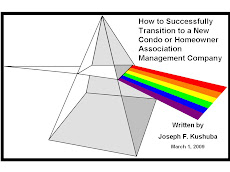 In today's customer-driven economy, businesses and associations must move to a customer-focused personalized approach. The expectation of association members is that they are the customers of a BoD. Members want to feel important and they want to know that a BoD has the necessary expertise to manage their interests. The more you demonstrate your specific understanding of their problems, concerns and aspirations, the more quickly they'll support you, often without really understanding what you are promoting or deciding.
In today's customer-driven economy, businesses and associations must move to a customer-focused personalized approach. The expectation of association members is that they are the customers of a BoD. Members want to feel important and they want to know that a BoD has the necessary expertise to manage their interests. The more you demonstrate your specific understanding of their problems, concerns and aspirations, the more quickly they'll support you, often without really understanding what you are promoting or deciding.Therefore, the highest goal of customer relationship management for a BoD is making sure they are keeping customers (members) happy, discovering and solving problems. A problem is simply the difference between what you have and what you want. It may be a matter of getting something, of getting rid of something, of avoiding something, or of getting to know what you want. In order to do this, they must build and nurture relationships with the members.
As a business professional, you should ask yourself: "What business am I in?" The answer is quite simple: if your business has anything to do with people – and ALL associations do - you are in the business of building relationships. "Some BoD's think that if they manage an association, they are in the business of making business decisions. They aren't. They are in the business of building relationships – because that's how you make decisions that are compatible with the needs and interest of association members.
In every association and business activity, influential people succeed and non-influential people don't. You cannot influence someone unless he or she likes you in some way. People are motivated for their reasons, not yours. Rapport is the key to influence. Rapport and influence start with acceptance of the other person's point of view, their state and their style of communication. To influence you have to be able to appreciate and understand the other person's standpoint. And these work both ways: I cannot influence you without being open to influence myself.
Beyond making decisions as an individual, and as every BoD member knows, the landscape gets a little more complicated when you are a leader of an organization such as a homeowner or condo association. First, you have to make decisions in a group environment. This is very different than individual-based decision making and involves a whole different set of dynamics, considerations, challenges, and opportunities. Personality traits such as emotional maturity and the ability to get alone with others take on more importance in making these types of decisions and managing an association. Rather than focusing strictly on business acumen or technical skill, associations need BoD members who can persuade as well lead, and communicate as well as command. It is a different type of skill set than the traditional command-and-control personality. It is a more subtle, sophisticated type and requires someone who is an "influencer."
But, probably the most unique dynamic is that comes into play is that a BoD is made up from members of a community in which they live. The people who elect them and who they represent are friends and neighbors. Therefore, the health of the association is fundamentally determined by the relationship the neighbors have for each other and for the BoD. Make bad decisions or untimely decisions that do not adequately represent the views of the overwhelming majority of members and you will lose their critical support. Power freak BoD members, spurred on by expensive and egotistical attorneys, attacking neighbors with nasty letters including threats of fines is not how good neighbors treat each other.
For that reason, when making decisions in an association, everything possible should be done to create and maintain open and amicable relationships. Members of the community should be encouraged to attend board meetings, to form and join committees, and to express their needs and opinions and solve mutual problems together. Although in some circumstances they do not have the right to vote on a particular topic, they certainly they have every right to be involved in the discussion pertaining to that topic. Limiting discussion to a few short minutes might be appropriate for large organizations and/or city council meetings, but they are over-control and over-kill for condo or homeowner associations. In spite of well intended advice from professional management company people to be formal, experience would suggest that informality and friendliness are far more effective. Demands are resented. Requests are honored.








